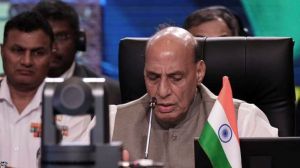In 1983, Hamid Ansari was South Block’s protocol chief when Prime Minister Indira Gandhi instructed special security for Cuban President Fidel Castro during his visit for the Non-Aligned Movement (NAM) summit. Castro, who faced life threats had survived assassination attempts, arrived with two planes, which landed within five minutes of each other. The iconic moment when Indira extended her hand and Castro embraced her captured the friendship between the Cuban leader and India.
Ansari is the last Indian leader to have met the Cuban leader when he visited Havana as vice president 30 years later in October 2013. “I met him in his villa, a modest one with a swimming pool and a garden… He spoke for about 20-25 minutes, on world affairs, and he spoke about India with great affection,’’ Ansari told The Sunday Express at his residence while recalling his meeting with the “magnetic personality”.

“He was mentally alert, physically alert for a man his age. Then he took us for a stroll in his garden, where he showed us plants — some from India. He also showed us the album pictures from his India visits.’’
Story continues below this ad
Castro’s relationship with India started on a warm note in 1960 when he met Jawaharlal Nehru in New York. While his meeting with Nehru sowed the seeds of a deep friendship, Congress leader Mani Shankar Aiyar said that it was during Indira’s tenure when the friendship solidified. NAM was the common ground while Castro was its leading voice. “He represented Cuba and his voice was much larger than the size of his country,” Aiyar said.
Deepak Bhojwani, who was India’s ambassador to Cuba from 2010 to 2012, said, “At that point of time, third world solidarity was very important… India and Cuba had considerable political affinity. Fidel’s personality was very important.”
Aiyar calls Castro an “icon of his age, who was a rebel with a cause, and symbol of resistance and was able to resist American pressure”. Ansari said that Fidel “could defy the greatest power on earth and continue to do that for half a century”, which was “no mean job”.
India kept its relationship with Cuba and the US separate. It did not end up in a zero-sum game, which is reflected in the last seven decades through high level visits.
Story continues below this ad
“Immediately after the Cuban Revolution, first Prime Minister of India Jawaharlal Nehru received Che Guevara in Delhi and met President Fidel Castro in New York. They developed instant rapport,’’ an Indian diplomat in Havana told The Sunday Express. “Thereafter, PMs Rajiv Gandhi and Manmohan Singh paid visits to Cuba in 1985 and 2006…’’ Castro visited India in 1973 and 1983 and Che Guevara in 1959.
Ansari called the bilateral ties “politically very good”, but “economically not much” because of the sanctions. Consequently, the India-Cuba trade that used to be around USD 300 million annually in 1980s fell following the disintegration of the USSR and changes in India’s economic policies in 1990s. “In 2014-15, it was around USD 39 million,” the Indian diplomat said. But despite the dip, Cuba was one of the first countries to support India’s right to be a permanent UN Security Council member in 1992.
To strengthen ties, India agreed to waive accumulated Cuban commercial debt worth $62 million. “The Indian government, with this gesture, showed its solidarity with the Cuban people and has opened the doors for further commercial transactions and finance in order to bring those economic ties to their full potential,” another Indian diplomat said.
While India started helping Cuba on other fronts, Biotechnology became an important element in strengthening the bonds. “We have already started joint operations with the prestigious Indian company, Biocon, to produce a cancer vaccine developed by Cuban scientists, and the success of the Cuban healthcare system has impressed many Indian leaders, including Rahul Gandhi, who visited Cuba in 2007 to learn more about it.’’
Story continues below this ad
With India cooperating on various fronts now — from IT to Biotech — what most Cubans remember is the way India helped in 1992 during the severe economic crisis by donating tonnes of wheat and rice.
Will the legacy of friendship be continued? “There is a strong bond that goes beyond the political leaders. I don’t see why it should not. This has been one of the articles of faith in our foreign policy. Our relations with individual countries is not influenced by their relationship with other countries, that is the principle,” said Ansari.

 Vice-President Hamid Ansari with Fidel Castro at his home in Havana during their last meeting in 2013.
Vice-President Hamid Ansari with Fidel Castro at his home in Havana during their last meeting in 2013.






